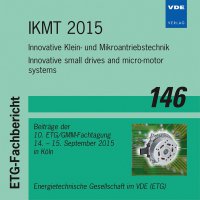Predictive control algorithms for fractional horse power drives
Konferenz: IKMT 2015 - 10. ETG/GMM-Fachtagung Innovative Klein- und Mikroantriebstechnik
14.09.2015 - 15.09.2015 in Köln, Deutschland
Tagungsband: IKMT 2015
Seiten: 6Sprache: EnglischTyp: PDF
Persönliche VDE-Mitglieder erhalten auf diesen Artikel 10% Rabatt
Autoren:
Wendel, Sebastian; Blank, Matthias; Loehdefink, Philipp; Dietz, Armin (Technische Hochschule Nürnberg, Institut ELSYS, Keßlerplatz 12, 90489, Nuremberg, Germany)
Inhalt:
This paper presents the application oriented evaluation of Model Based Predictive control algorithms for industrial fractional horse power drives. Along with application-tailored design of the converter and the efficient design of the drive and trajectories, high energy saving potentials can be exploited by intelligent control. One of the most promising control methods for complex and non-linear drive systems is model predictive control (MPC). This control method opens up new possibilities in terms of dynamic and energy efficiency of electrical drive systems. With MPC it is possible to address criteria such as energy efficiency and the switching frequency directly in the control algorithm. This enables MPC to control the efficiency, unlike to the conventional control methods. MPC is based on the calculation of the necessary control signals for each possible future state of the system. A cost function gives the most suitable control signal for each control cycle combined with a minimum reaction time, in the same step as one of the possible states occurs. The consideration of various criteria and the calculation of possible future states requires a huge processing power, which can be handled by new powerful microcontrollers. Through the holistic view of model-based predictive control on the controlled system, it is possible to improve the energy efficiency and dynamics of power converters and drives. Simulation and experimental results of model predictive control will be used to demonstrate the potential of this new control method at the example of a brush-type DC-motor.


